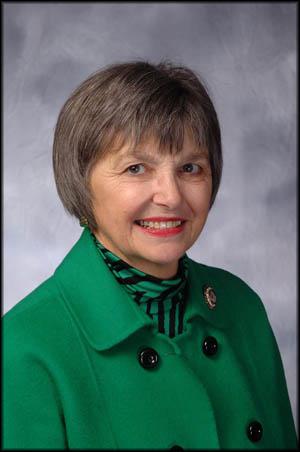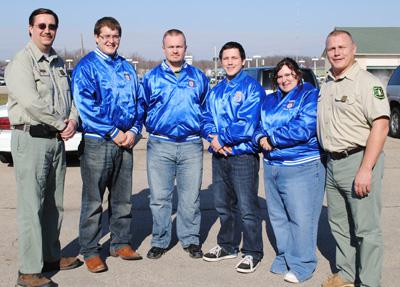
By Annabeth Miller, SMT Editor
The map of new state senate and house districts finally released by a panel of appeals judges has taken time for adjustment in the Bootheel.
The “old” 25th Senatorial District – represented now by State Senator Rob Mayer of Dexter – included Stoddard, Butler, Dunklin, New Madrid, Pemiscot, Ripley and Wayne counties.
But the “new” district has lost some counties and gained some, too. The new district contains the “heart” of the old 25th – Stoddard, Wayne, Dunklin, Pemiscot, New Madrid. But added are Bollinger, Scott and Mississippi counties and Butler County is lost to the new District 33.
Making the situation even more cumbersome is the fact that Mayer is prevented by term limits to seeking a new term.
Enter the candidates.
On the Democrat side, there has only been one candidate for months. State Rep. Terry Swinger of Caruthersville announced last year he would be seeking the Democrat nomination for the seat in the senate.
Swinger has Dexter roots – graduated in the 1960s from Dexter High School and has family that still lives in Stoddard County. A Caruthersville eye doctor, Swinger was first elected in a special election in 2003.
But the Republican side, there has been some movement and a mix of candidates.
State Rep. Gayle Kingery and businessman Jeff Schwan – both of Poplar Bluff – attended the Stoddard County Lincoln Day Banquet last March as candidates for the senate seat.
Kingery withdrew from the race, citing family considerations. Schwan also withdrew from the race in favor of Poplar Bluff businessman Doug Libla. But when Butler County no longer in the 25th District, Libla decided to run in the new 33rd District.
Dexter’s Wright stays in the race to succeed Mayor. He has served in the Missouri House of Representatives since 2004, and has served on committees important to the region, including Appropriations, Agriculture Policy, Veterans, and Emerging Issues in Animal Agriculture.
However, Wright is now facing a new primary opponent from a colleague from Sikeston.
On Monday, fellow State rep. Ellen Brandom of Sikeston throw her hat into the 25th district race.
On Monday, Brandom said she has decided to stay close to home in light of the redistricting shake-up and run in the new state 25th Senate District -- not the new 3rd District. Cape Girardeau county joins with northern counties to form the new 3rd District. Scott – where Brandom lives – is in the 25th District.
Brandom could have run in the 3rd District -- it was part of her existing 160th House District boundaries, which includes a portion of Cape Girardeau County. But she would have had to move if she decided to seek re-election to the 3rd District one year before the 2016 election.
Brandom, of Sikeston, was first elected to House District 160 in 2006.
Both the Missouri House and Senate maps were redrawn this year, a requirement of a state constitutional requirement following each census to reflect changes in population. After two commissions failed to agree on maps, a panel of appellate judges redrew the boundaries. It was the first time in Missouri history that a panel of judges decided district boundaries.
The panel actually released two Senate maps in recent weeks. The second was drawn up after the first one came under criticism for being unconstitutional.

COLUMBIA, Mo. –Missouri voters approved legislative term limits in 1992, and they have been in effect for nearly a decade. The term limits restrict Missouri state legislators from serving more than eight years in the same legislative chamber.
Now a Mizzou researcher has studied the effects of term limits, and thinks the effect has not always been good for state government.
David Valentine, a research associate professor in the Truman School of Public Affairs at the University of Missouri, studied the effects of these term limits a decade after they were enacted. He found the term limits have had a negative effect on the institutional knowledge of legislators.
“Term limits have caused a dramatic decrease in the amount of legislative experience in the last ten years,” Valentine said. “It takes most new legislators about four years to learn the intricacies of the legislative process, the social organization of the House and Senate, the details of government, broader issues, and how to balance everything with the needs of their districts and the expectations of their party. By the time they gain this knowledge, they only have a relatively short time to utilize their knowledge before their term limit expires. In addition, the absence of experienced legislators precludes learning from more experienced peers.”
One of the primary arguments for supporters of term limits is that the limits will decrease the amount of influence lobbyists have on the policy-making process. Valentine found that the opposite seems to be true and that lobbyists seem to be gaining more influence among legislators.
“Many new, inexperienced legislators do not fully understand many of the complex issues for which they must make policy,” Valentine said. “They are so busy learning how to do their jobs before their term limit expires that they do not have time to adequately research each issue. This often results in legislators relying on lobbyists to educate them on issues, and while most lobbyists do not try to deliberately mislead legislators, the legislators may only get one side of multi-faceted issues.”
Valentine believes simply repealing term limits would do little to change the culture or the performance of the Missouri legislature in the foreseeable future. He suggests that a repeal of term limits should be coupled with a careful review of legislative performance to ensure that the legislature is prepared to meet the demands of the future.
More broadly, Valentine indicates that voters should have a more realistic view of the role of legislators. He believes civic education in schools is important, as well as fostering knowledge among contemporary voters of how state government works. Valentine says the state cannot expect a significant positive change in legislative performance without a more informed and engaged citizenry.
Link of Interest
By Annabeth Miller, SMT Editor
Two hundred years ago - Dec. 16, 1811 - the New Madrid Seismic Zone unleashed one of the most powerful earthquakes to shake the lower 48 states. It was a quake so powerful it caused waterfalls on the Mississippi River, shook houses in Charleston. S.C., and rang church bells in Boston.
The first terrifying jolt hit at 2:15 a.m., with modern estimates pinning it at 7.7 on the Richter scale. Six hours later came what is now known as the Daylight Shock, a quake of similar intensity.
Nor was the New Madrid finished. It produced a 7.5-magnitude temblor on Jan. 23, 1812, and another 7.7 quake on Feb. 7, 1812. The USGS notes that some other sources have calculated the power of the Feb. 7 quake at 8.8, a measurement that would make it the second most powerful quake to hit the 48 contiguous states and the third largest ever among the 50 states.
The New Madrid continues to rumble, but somewhat more gently. Between Dec. 7 and Dec. 12 of this year, USGS recorded six small quakes ranging from 1.0 on the Richter scale near Ridgely and Tiptonville, Tenn., to a 2.4-magnitude quake about 1 mile west-southwest of Blytheville. Arkansas has also experienced a large swarm of quakes around Greenbrier and Guy in north-central Arkansas, one a large as magnitude 4.7.
“If the Mid-South had been as populated in 1811-12 as it is now, the destruction from that Dec. 16 quake would have been incalculable,” said Deborah Tootle, associate professor for community and economic development for the University of Arkansas Division of Agriculture. “And while nothing of that magnitude has shaken Arkansas in this century, we still have enough seismic activity to remind us that we need to be prepared.”
Buildings were flattened near the epicenter in Arkansas, and chimneys toppled hundreds of miles away. Boats on the Mississippi River were overturned. And large tracts of land became like liquid, swallowing croplands, grasslands and bottomland forests, leaving surface scars visible to this day.
Over three months in 1811-12, the quakes and hundreds of aftershocks rocked the Midwest and upper South, including portions of Kentucky. They remain among the most powerful earthquakes to ever strike the United States, occurring just across the Mississippi River near Western Kentucky.
Eliza Bryan, of New Madrid wrote her eyewitness account March, 1812.
On the 16th of December, 1811, about two o'clock, a.m., we were visited by a violent shock of an earthquake, accompanied by a very awful noise resembling loud but distant thunder, but more hoarse and vibrating, which was followed in a few minutes by the complete saturation of the atmosphere, with sulphurious vapor, causing total darkness. The screams of the affrighted inhabitants running to and fro, not knowing where to go, or what to do —the cries of the fowls and beasts of every species —the cracking of trees falling, and the roaring of the Mississippi — the current of which was retrograde for a few minutes, owing as is supposed, to an irruption in its bed — formed a scene truly horrible.
And on the bicentennial of the New Madrid quakes, geologists and emergency planners say future quakes along the fault are certain — and the U.S. Geological Survey expects that eventually, some will be very damaging.
“Earthquakes can strike anywhere, at any time, and without warning,” said Julie Rochman, president & CEO, IBHS. “Effective disaster safety measures can protect lives and property, but only if action is taken before an earthquake hits.”
IBHS has a pair of free consumer guides available on its website, http://www.DisasterSafety.org, which provides information on how to effectively prepare property for an earthquake.
Links of Interest

An SMT Report
Student leaders from Mingo Job Corps Center paused before the end of the semester to recognize accomplishments.
The students had their Leadership Retreat last week with a pizza lunch at Dexter Pizza Company. Guest speaker was the Rev. Micheal Kohlbaker of First Assembly of God Church in Dexter.
Students were recognized for the leadership and service to the school and to their dorms, the school’s recreation programs and Student Government Association.
Student leaders recognized were:
Dorm 1: Top Leader – Trent Powell; Most Improved Leader - Kery Ledbetter; Top Dorm Council – Bandon Nixon.
Dorm 2: Top Leader – JaVier Correa; Most Improved Leader - Myren Jackson; Top Dorm Council – Kaleb Colbert.
Dorm 3: Top Leader – Michael Timmens; Most Improved Leader – Jospeph Lawsen; Top Dorm Council – John Braddock.
Dorm 4: Top Leader – Amber Swift; Most Improved Leader – Samantha Reese; Top Dorm Council – Michelle Nalezyty.
Recreation: Top Recreation Officer: Tyler Fugate; Top Recreation Assistant: Jarred Erickson; Most Improved: Izak Buttlinger
Student Government Association: Top Lead: John Thomas; Most Improved: Derik Grady; Top S.G.A. Council: Michael Timmons.
The Leader of the Quarter award was given to Kory Ledbetter.
Photo Above: Student government leaders and Tim Aslin and Bob Waldner pause during Mingo Job Corps' Leadership Retreat.

Verizon Celebration
A celebration was held Monday afternoon at Verizon Wireless in Dexter, as the Dexter Chamber of Commerce held a ribbon-cutting celebration marking the opening of the new Verizon Wireless store on West Business Highway 60 in Dexter. On hand for the celebration were (front row, from left) Chamber Executive Janet Coleman, Jerri Morgan-Pierce, Dexter Mayor Joe Weber, Verizon Wireless Manager Carla Pixley, Brittany Bedford and Kaycee Snyder of the Verizon Wireless store, Dexter Chamber President Ed Gargas, Christa Christian of Southeast Missouri Behavioral Health, and Dexter City Alderman Jerry Corder; (back row, from left) Reade Ferguson of Associated Building Solutions, Alderman Tim Aslin, Alderman Terry Battles, and Chamber Director Wes Howard. Verizon Wireless at 1311 West Highway 60 in Dexter is open seven days a week for customer’s convenience; holiday hours include Monday through Friday 9 a.m. until 8 p.m. and on Saturday from 9 a.m. until 7 p.m. and Sunday from 11 a.m. until 6 p.m. Verizon Wireless may be reached at 573.614.5314. Welcome to Dexter! (SMT Photo by Annabeth Miller)

